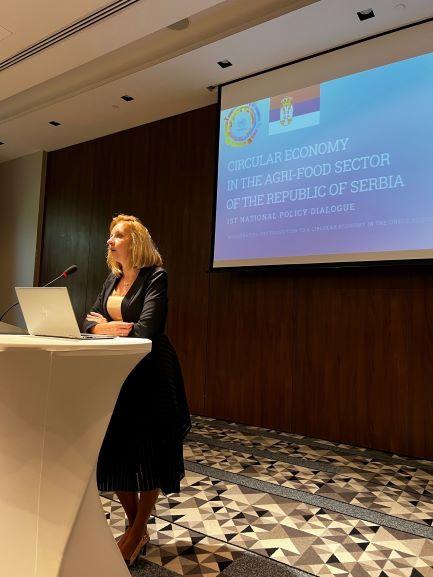Background
In spring 2021, at the 69 Session of the United Nations Economic Commission for Europe (UNECE), the 56 member States of UNECE took important decisions regarding the circular economy and the sustainable use of natural resources. In relation to these decisions, the project “Accelerating the transition towards a Circular Economy and the Sustainable Use of Natural Resources in the UNECE region” was launched in October 2021 to chart the way forward through in-depth discussions on the gaps, potentials and member States’ experiences in the transition to a circular economy. Serbia is one of the project's beneficiary countries.
Capacity-building project "Accelerating the transition towards a Circular Economy and the Sustainable Use of Natural Resources in the UNECE region”
The UNECE UNDA project aims to support the design and implementation of national policies, programmes and strategies for promoting a circular economy. It is funded by the United Nations Development Account (UNDA) and implemented in the timeframe of 2021-2024.
Serbia is one of the project countries and it is planned to implement two national policy dialogues to strengthen the capacities of national stakeholders, which will lead to development of one national gap analysis and one national road map or action plan to accelerate the transition to a circular economy in agriculture through waste reduction and prevention.
More information on the project is available here: Accelerating the Transition towards a Circular Economy in the UNECE region | UNECE
Objectives of the First National Policy Dialogue in Serbia
- Strengthen the knowledge of government officials and other participating stakeholders of the circular economy definition and its core principles. Raise awareness about the successful circular economy practices, positive economic, environmental, and social implications, as well as requirements for the circular economy transition. Address the applicability of these issues in the national context of Serbia.
- Identify relevant stakeholders in Serbia from circular economy-related ministries, statistical offices, national agencies, research institutes/academia, NGOs, and the private sector.
- Take stock of the circular economy-related legislation and regulations that are currently in place in Serbia. This includes action plans, national strategies, national circular economy-related goals, specific laws or policies or other governmental documents.
- Discuss the preliminary findings of the national gap analysis developed by the national consultant to identify policy, regulatory and institutional limitations that hold back the circular economy transition in Serbia and how this process can be accelerated by putting in place effective waste management with a focus on agriculture and food waste. Train on how policy recommendations that are derived from the gap analysis can be implemented.
Downloads
Agenda and Presentations
9:00-9:30 OPENING AND INTRODUCTION
Welcome and short opening remarks:
- Ms. Sandra Dokić, Assistant Minister for the Sector for international cooperation, projects, and climate change, Ministry of Environmental Protection of the Republic of Serbia
- Ms. Vedrana Ilić, Assistant Minister, Ministry for Agriculture, Forestry and Water Management of the Republic of Serbia
- Ms. Francoise Jacob, UN Resident Coordinator in Serbia
- Ms. Marit Nilses, Economic Affairs Officer, UNECE
Accelerating the circular economy in UNECE region – workshop agenda and objectives
- Ms. Roksolana Shelest, Associate Economic Affairs Officer, UNECE PPT
9:30-10:30 CIRCULAR ECONOMY IN SERBIA
National roadmap in Serbia and agri-food sector management
- Ms. Aleksandra Vučinić, Head of Department for Circular and Green Economy, Ministry of Environmental Protection of the Republic of Serbia
Sustainable food systems in Serbia
- Mr. Milos Stojanovic, Ministry for Agriculture, Forestry and Water Management of the Republic of Serbia
Existing initiatives on traceability of food
- Mr. Goran Simunovic, Portfolio Manager, UNDP PPT
Existing initiatives on circular economy and food loss and waste
- Ms. Aleksandra Šiljić Tomić, Project Coordination Specialist, UNEP PPT
Food loss and waste initiatives in the region
- Mr. Robert VanOtterdijk, Agro-Industry Officer, Regional Office for Europe and Central Asia, FAO (virtual) PPT
Coffee break
10:45-12:30 INTERNATIONAL EXPERIENCE IN THE CIRCULAR ECONOMY TRANSITION AND FOOD WASTE MANAGEMENT AND ITS RELEVANCE IN SERBIA
EU policy on the food waste management: perspective for a candidate country
- Ms. Agnieszka Sznyk, President of the Board INNOWO, Member of Coordinating Group of European Circular Economy Stakeholder Platform (virtual) PPT
National strategy document on prevention, reduction and monitoring of food Loss and waste in Turkey
- Mr. Burçak Yüksel, Acting Head of Monitoring and Evaluation Department, Ministry of Agriculture and Forestry of Republic of Turkey (virtual) PPT
Addressing food loss and waste issues in Finland
- Ms. Hanna Mattila, Senior Specialist, Ministry of Environment of Finland (virtual) PPT
Circular economy, agri-food value chains and trade - application of circular economy across the agri-food sector,recycling and valorization of agri-food waste
- Mr. Shane Ward, Professor of Biosystems Engineering, University College Dublin PPT
UNECE training on circular economy
- Ms. Jessika Richter, UNECE consultant (virtual) PPT
Practical Solutions in Waste Management
- Mr. Brian McCarthy, representative of the Resource and Waste Advisory Group (virtual)
Lunch break
13:30-15:00 CHALLENGES IN FOOD WASTE MANAGEMENT IN SERBIA (GAP ANALYSIS)
Presentation of the gap analysis on circular economy and food waste management in Serbia
- Ms. Elena Jankovic national consultant PPT-English PPT-Serbian
Work in groups – mapping main challenges
Coffee break
15:15-17:00 DISCUSSION ON KEY ISSUES AND GOALS AND DEVELOPING RECOMMENDATIONS
National circular business models
- Nikola Stanojevic, CEO, SOMA, Serbia PPT
- Ms. Marina Cvijanovic, Ecobionvest start up (virtual) PPT-English PPT-Serbian
- Mr. Vojin Djurdjevic, owner, Ecoservis
Roundtable discussion
Closing remarks
- Ms. Roksolana Shelest, UNECE
Contact information
